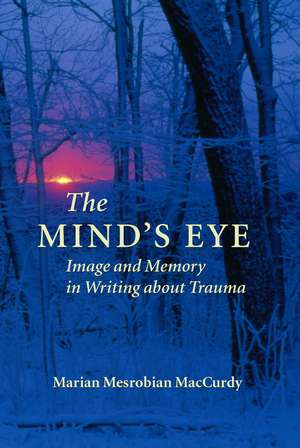The Mind's Eye: Image and Memory in Writing about Trauma
Autor Marian Mesrobian MacCurdyen Limba Engleză Paperback – 26 feb 2007
In the post-September 11 world, therapeutic writing has become a topic of heightened interest in both academic circles and the popular press, reflecting a growing awareness that writing can have a beneficial effect on the emotional and cognitive lives of survivors of traumatic experiences. Yet teachers and others who encounter such writing often are unsure how to deal with it. In The Mind's Eye: Image and Memory in Writing about Trauma, Marian Mesrobian MacCurdy investigates the relationship between writing and trauma, examines how we process difficult experiences and how writing can help us to integrate them, and provides a pedagogy to deal with the difficult life stories that often surface in the classroom.
MacCurdy begins by discussing what trauma is, how traumatic memories are stored and accessed, and how writing affects them. She then focuses on the processes involved in translating traumatic images into narrative form, showing how the same patterns and problems emerge whether the writers are students or professionals. Using examples drawn from the classroom, MacCurdy investigates the beneficial effects of the study of trauma on communities as well as individuals, witnesses as well as writers, and explores the implications of these relationships for the world at large, particularly as they pertain to issues of justice, retribution, and forgiveness.
Throughout the volume the author draws on her own experience as teacher, writer, survivor, and descendant of survivors to explain how one can engage student work on difficult subjects without appropriating the texts or getting lost in the emotions generated by them. She further shows how appropriate safeguards can be put in place to protect both teacher and student writer. The end result of such a pedagogy, MacCurdy demonstrates, is not simply better writers but more integrated people, capable of converting their own losses and griefs into compassion for others.
MacCurdy begins by discussing what trauma is, how traumatic memories are stored and accessed, and how writing affects them. She then focuses on the processes involved in translating traumatic images into narrative form, showing how the same patterns and problems emerge whether the writers are students or professionals. Using examples drawn from the classroom, MacCurdy investigates the beneficial effects of the study of trauma on communities as well as individuals, witnesses as well as writers, and explores the implications of these relationships for the world at large, particularly as they pertain to issues of justice, retribution, and forgiveness.
Throughout the volume the author draws on her own experience as teacher, writer, survivor, and descendant of survivors to explain how one can engage student work on difficult subjects without appropriating the texts or getting lost in the emotions generated by them. She further shows how appropriate safeguards can be put in place to protect both teacher and student writer. The end result of such a pedagogy, MacCurdy demonstrates, is not simply better writers but more integrated people, capable of converting their own losses and griefs into compassion for others.
Preț: 191.97 lei
Nou
Puncte Express: 288
Preț estimativ în valută:
36.74€ • 38.26$ • 31.05£
36.74€ • 38.26$ • 31.05£
Carte indisponibilă temporar
Doresc să fiu notificat când acest titlu va fi disponibil:
Se trimite...
Preluare comenzi: 021 569.72.76
Specificații
ISBN-13: 9781558495586
ISBN-10: 1558495584
Pagini: 240
Dimensiuni: 154 x 225 x 23 mm
Greutate: 0.36 kg
Ediția:First Edition
Editura: University of Massachusetts Press
Colecția University of Massachusetts Press
ISBN-10: 1558495584
Pagini: 240
Dimensiuni: 154 x 225 x 23 mm
Greutate: 0.36 kg
Ediția:First Edition
Editura: University of Massachusetts Press
Colecția University of Massachusetts Press
Recenzii
"MacCurdy makes the case for the classroom to become a place of personalized, transformative learning. She provides a well-researched, effective, and safe pedagogical approach for teachers to help writers engage in healing. . . . This is an example of terrific interdisciplinary scholarship."—Laurie Vickroy, author of Trauma and Survival in Contemporary Fiction
"The Mind's Eye distinguishes itself from other scholarship about the relationship[ between writing and trauma because if its attention to teaching and learning; indeed, it is essential reading for all who use personal writing in the classroom because MacCurdy provides detailed suggestions to help students write about traumatic experiences."—Literature and Medicine
"The Mind's Eye distinguishes itself from other scholarship about the relationship[ between writing and trauma because if its attention to teaching and learning; indeed, it is essential reading for all who use personal writing in the classroom because MacCurdy provides detailed suggestions to help students write about traumatic experiences."—Literature and Medicine
Notă biografică
Marian Mesrobian MacCurdy is professor of writing at Ithaca College.
